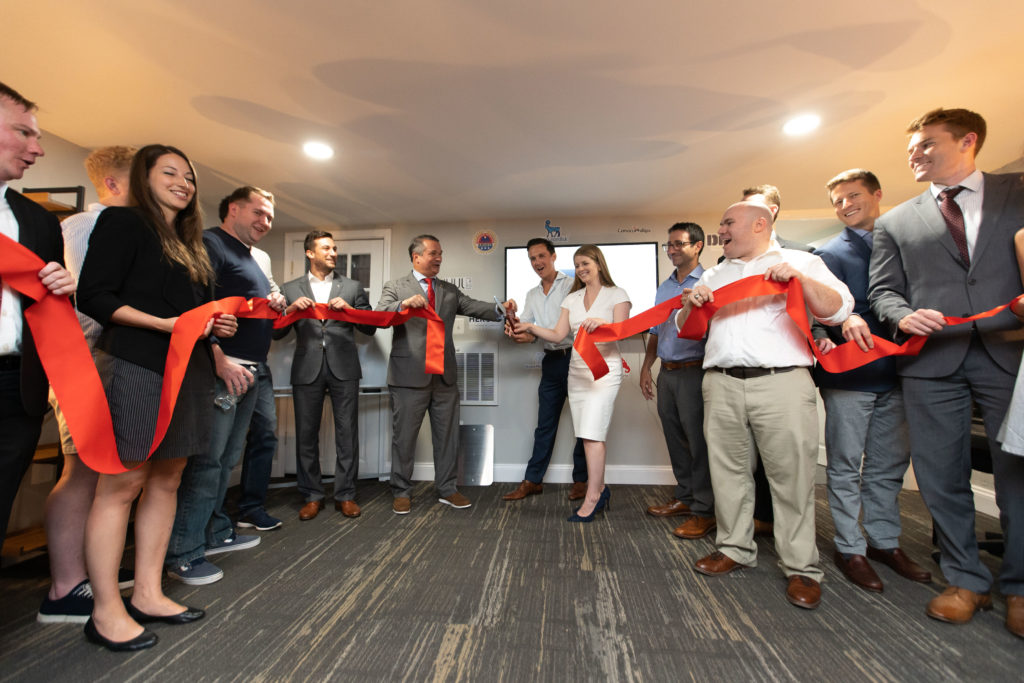Most people are familiar with the stories of starving artists heading to Hollywood, laying everything on the line to live out a dream and work for that “big break” on the silver screen. Less known are the stories of veterans with little or no money heading to Washington, D.C., pursuing a passion for public service in hopes of carving out a career.

Thirty-six-year-old Navy veteran Justin Brown knows that story well. He lived it in 2007 when he left Utah with his wife and baby and moved to the nation’s capital.
“I don’t think that most financial advisors would recommend selling everything you own and potentially taking out a student loan to move a young family to a city for a non-paid position,” says Brown. “In retrospect, I would call it crazy.”
Brown had just completed college, earning a degree after leaving the Navy, which deployed him to the Middle East three times. He searched for a “sense of service” in his post-military life and accepted an unpaid internship for the late Rep. Tom Lantos (D-California). Doors opened, jobs followed and he now runs his own policy firm, The Nimitz Group, which is a bipartisan government relations firm tackling veteran and health care issues.
But Brown never forgot his challenging start. He founded HillVets in 2013 with a goal of building a community for fellow veterans taking a similar path to Washington, D.C. “They come out here. They don’t really know what they’re getting themselves into,” says Brown. “They may or may not have a network. And they may have challenges with resources.”
Bridging the networking gap

HillVets aims to bridge those gaps. What started out with a meeting held at a local “watering hole” morphed into a networking organization that includes former Defense Secretary and U.S. Senator Chuck Hagel as the Chairman of the Advisory Board, as well as 40 members of Congress.
The nonprofit offers fellowships that place veterans in full-time positions, especially on Capitol Hill where less than two percent of congressional staffers served in the military, according to a January 2019 survey done by HillVets.
“Working on Capitol Hill in itself has become very privileged. Most of the young men and women who are up here are often funded by parents who can afford to fund them for non-paid positions for extended periods of time in order to find and compete for a very limited number of roles,” explains Brown. The group wants to see more veteran representation.
Welcome to HillVets House
To address the affordability hurdle, HillVets started providing housing in late 2015 and opened its new HillVets House in July. Not all fellows accepted into the fellowship program need housing. Those who do are provided a place to live during their fellowships, which can last up to eight months. They are also given a stipend for food.

Twenty-eight-year-old Army veteran Elise Fink is a current resident. The Connecticut native left the military earlier this year after serving as a human resources officer overseas and in the U.S. She cites her “passion for politics” as her reason for applying to HillVets.
She’s now doing a fellowship in the office of Sen. Doug Jones (D-Alabama) but says if she had to pay housing costs, things would be different. “I would not be working for Senator Jones without HillVets,” said Fink. Currently, she is the only woman in the HillVets House which can house up to eight people. “It’s fine. We all get along. We all help each other.”
While fellows have a shared experience in the military, their backgrounds run the gamut stretching across different military branches, regions of the country, and political ideologies. Resident Nicholas Riffel, a 30-year-old Marine veteran, compares living there to a version of The Real World, a popular reality show in the 1990s, “in the best possible way,” adding “you get a lot of people from all walks of life. It’s been great, to be honest with you.”
Riffel particularly appreciates the camaraderie and the feeling of not being isolated. It’s a stark contrast to his situation in the early part of this past summer. He vividly recalls his interview for the HillVets Fellowship in which he was asked where he was living. He pointed outside a window to his truck.
He says he lived in his truck for “two months and change” while he interviewed for jobs, carving out a space inside his vehicle where he kept his suits. “I want to be here. I want to do this. I want to be that voice,” said Riffel who recently completed a fellowship with Rep. Virginia Foxx (R-North Carolina).
Determined to have a “seat at the table”
Riffel is determined to have a voice in public policy after his experience as a combat veteran who served two tours in Afghanistan. During that second tour, he was caught in an ambush and shot three times in his back, chest, and arm. He counts roughly 14 different surgeries, two blood transfusions, and almost had to have his arm amputated during a year of recovery.
Once he left the military, Riffel attended the University of Akron in Ohio to study political science and criminal justice. He worked on two Senate campaigns in the Midwest before deciding to head to Washington in pursuit of a “seat at the table.”
“There’s not a large veterans’ presence or voice on the Hill and I want to be that person in and around D.C.,” Riffel tells WorkingNation. Fink also feels she brings a “unique perspective” as a female veteran. She cites few female veteran staffers in Congress while women make up the fastest-growing segment of the veteran population. “I think it’s important to have our perspective in order to create legislation,” Fink says.
Already during Fink’s fellowship, she’s worked on introducing a resolution in the Senate to establish a fellowship for wounded veterans. Riffel’s experience has enabled him to learn firsthand the process of how legislation is written and believes he can add his voice to issues ranging from homelessness to foreign policy. It’s a familiar theme among post 9-11 veterans says the founder of HillVets.
“They’re getting out of the service, been deployed many times, and they really just have a sense of service to our country. They want to continue serving,” Brown tells WorkingNation. He counts 56 veterans who’ve completed the fellowship program, to date, almost all of them landing permanent positions. That number now includes Riffel who has accepted a role as a National Security Policy Advisor to The American Legion.
His start in Washington is being met with some surprise. “Man, I’ve heard about people going to California and trying to make it in the movies, but I’ve never heard of anyone trying to make it in politics living out of a truck,” he recalls someone saying after learning he lived in a truck for roughly two months. “Well, I guess that’s me,” he told them.
“Nick embodies a story that many of us share,” says Brown. It wasn’t a truck for all of us. For me, it was a really decrepit basement. I knew I didn’t have long before I was homeless and I was going to be moving back to Utah because I had no other choice.”
The way Brown sees it, opening doors for veterans on Capitol Hill serves a larger purpose. “It’s in our nation’s interest to have more of these men and women up here.”
Follow more of our Vets Deserve Good Jobs coverage here.











